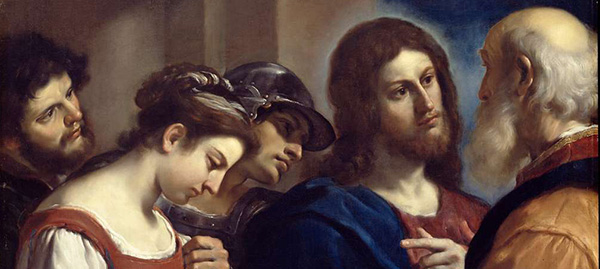
V/ I will turn to you O God,
R/ to God who gives joy to my youth
V/ Give me the Wisdom that sits by your throne;
R/ that I may be counted among your children
Lord, in your all-providential plan, you have led me to this moment to rediscover me in your Word and Wisdom. Aid me to make this time of meditation and prayer enriching, transforming, and liberating for my well-being and others. Amen!
CRUCIFORM LOVE OF CHRIST
By Dr. Joanne Mosley
FIFTH SUNDAY OF LENT
Isaiah 43:16-21; Psalm 126(125): 1-6; Philippians 3:8-14; John 8:1-11
6th April 2025
The Lenten theme of journeying to the Promised Land is today taken to a new level. The Israelites are once more in exile, this time captives in Babylon. The first reading, from Isaiah 43, begins by recalling the exodus out of Egypt – an event so important that Moses instructed the people, in Exodus 13:3-10, to remember it always. But now, the Lord says to them: ‘Remember not the former things, nor consider the things of old.’ How can this be? It is because God will do something even greater: ‘Behold, I am doing a new thing’.
There is a mysterious quality in this passage from Isaiah, to which we can well apply St Teresa’s comment on Scripture: ‘one word of His will contain within itself a thousand mysteries’. This new exodus seems to suggest a fulfilment and thus to transcend just one particular journey. Even the path of dry land through the waters, in the first exodus, seems mysteriously inverted: this time, it will be water running over dry land.
There are clues, not least in the previous chapter which has given us the first of the ‘Servant songs’; there, we hear that on him God has placed his spirit (cf. Isaiah 42:1). Quoting the verse about creating ‘a new thing’, the Catechism explains that this points to Christ and the Holy Spirit. Indeed, the imagery of abundant water in the reading from Isaiah 43 suggests an effusion of the Spirit streaming from the side of Christ (cf. John 19:34). This reading, near the end of Lent, points us already to the fruits of Christ’s Passion: to the institution of the Church, to life in the Spirit, and ultimately to eternal life.
In Philippians we see the old and the new in the personal journey of St Paul. ‘All the intensity of St Paul’s soul is poured out in these lines,’ wrote Elizabeth of the Trinity. Paul has just said that as a Jew he had kept the Law perfectly; this would have made him righteous. But the converted Paul, preaching passionately that righteousness comes from faith in Christ, describes his previous observing of the law as loss: he wants to gain only Christ.
Elizabeth makes this passage her own. She wants to share Christ’s sufferings and become like Christ in his death. So she decides to ‘study this divine Model’, she says, to become more like Christ – ‘and even more,’ she adds, ‘to become so one with Him that we may say: “I live no longer I, but He lives in me”’ (cf. Galatians 2:20). This, Paul sums up, is where God, in Christ, has called us.
The episode of the woman caught in adultery is the last Sunday reading before Holy Week and therefore all the more significant. Her accusers bring her to Jesus and ask his opinion about the prescribed sentence in the Law, so as to try and bring a charge against him. It is a trap indeed. With consummate wisdom, Jesus invites whoever is without sin to cast the first stone, and her accusers walk away.
Jesus, the fulfilment of the Law – the Law of the New Covenant in person, as Edith Stein tells us – acts with justice, we could say, by not condoning the sin, but at the same time with mercy, wanting the sinner to be saved. In an even more radical shift from the old to the new, Jesus, the Sinless One, will be condemned and put to death – from which he will rise again, bringing us the gift of eternal life.
Daily Offering
Lord, I offer myself to you anew, in scaling the heights of Carmel by taking to heart your Word and Wisdom communicated through this time of meditation. May I be transformed into a prayer presence in the World. Amen
Questions for reflection:
• What, in your own spiritual journey, speaks to you most of a transition from the old to the new?
• What does gaining Christ mean to you personally?
• How does the knowledge of God’s mercy and forgiveness influence the way you relate to Jesus?
Suggested Exercise for the Week
Contemplate the lamentable condition of my attempts at self-righteousness. Remain acutely aware of your own longing for mercy, and in a spirit of solidarity, strive to embody the essence of Christ’s mind, fostering a deep bond of compassionate concern for others.
Commit to Heart: Only Christ
